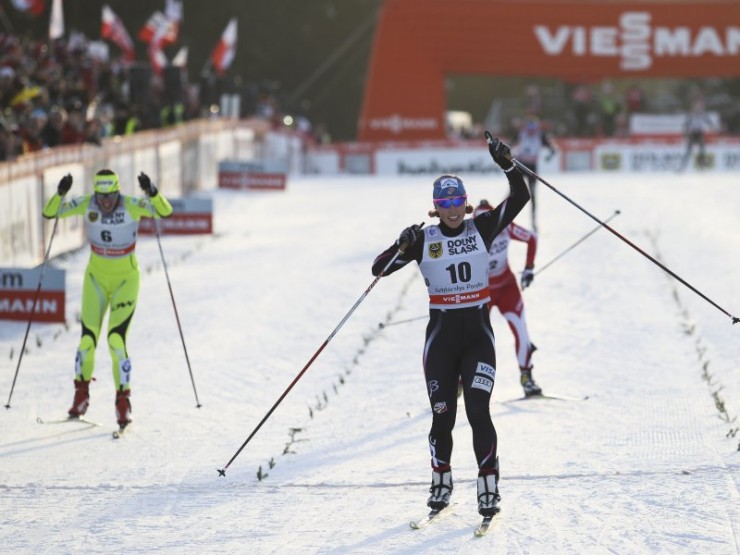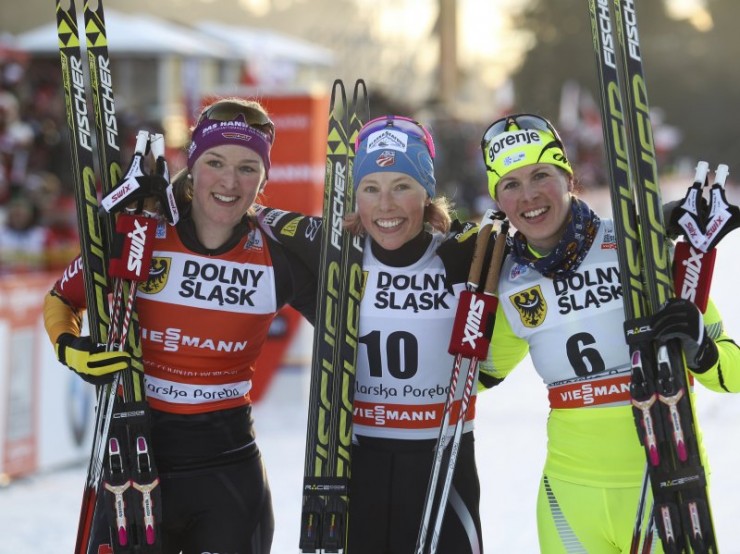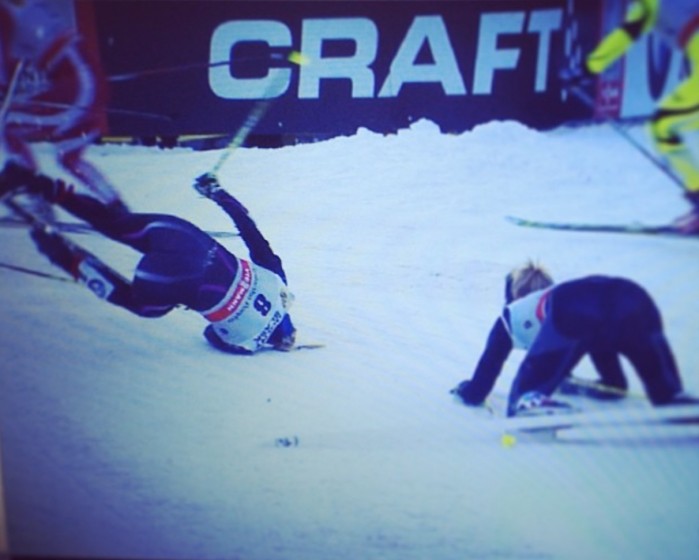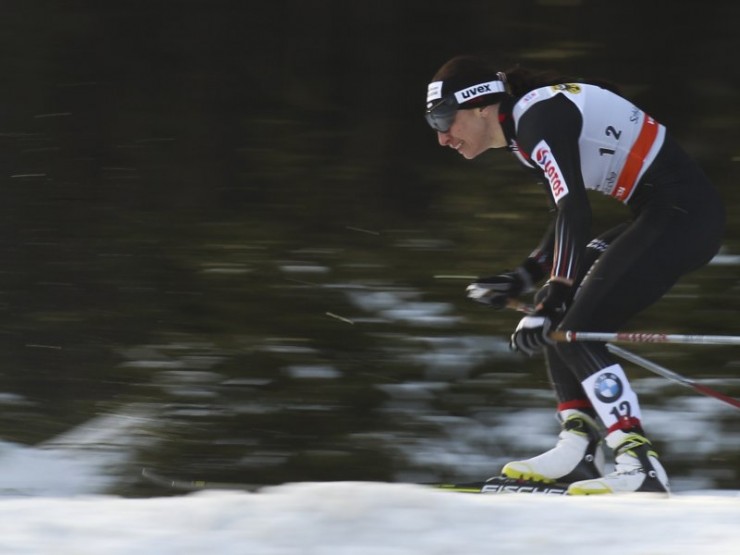
Two years ago at a World Cup freestyle sprint in Szklarska Poręba, Poland, Kikkan Randall’s run for the podium was almost over soon after it began.
The U.S. Ski Team standout had made it all the way to final, where she squared off against two Norwegians (Maiken Caspersen Falla and Astrid Uhrenholdt Jacobsen), a Swede (Ida Ingemarsdotter), Laure Barthelemy of France, and Russia’s Natalia Matveeva. Skiing in the middle of the pack as all six women exited the stadium, Randall went down, taking Matveeva with her. Spectators gasped, and the Norwegians, Ingemarsdotter and Barthelemy skied away.
Moments later, Randall was back on the train, skiing in fifth and suddenly challenging the leaders up the outside of the track. She ended up hanging in third, giving Ingemarsdotter a run down the finishing stretch, but ultimately running out of steam. The Swede won and Falla edged Randall in a photo finish for second.
It was a great result, one Randall could be proud of after an unfathomable recovery, but this Saturday’s 1.5-kilometer freestyle sprint was a chance to rewrite history. Racing once again in Szklarska Poręba on a slightly tighter and more technical course than two years ago, Randall had an opportunity to win her second-straight World Cup skate sprint (after winning a week ago in Nove Mesto, Czech Republic) and display another one of her strengths: devouring flat courses.
Randall’s known for a lot of things: skate sprinting, sprinting in general, childhood (and adult) inspiration, pink hair, and powerful attacks on hard climbs. Szklarska Poręba’s new sprint course didn’t have any of those hills for Randall to work her magic on — instead one long gradual in the middle of the loop — followed by a gradual downhill where no-pole skating was key.
“The snow was packing down super hard today and it was kind of hard to balance on,” Randall explained on the phone.
The final corner before the finish — tighter than before — proved to be the most troublesome throughout the day. Qualifying in 10th (3.79 seconds back from Italy’s Greta Laurent, who was fastest in 3:08.69, without any Norwegians, Finns or Swedes competing), Randall won her quarterfinal and semifinal en route the final. Laurent finished fifth in the quarterfinal (behind Randall), failing to advance, while Randall moved along and made tactical changes throughout the heats. Among the most important: how to approach the last turn.
“Everyone was coming in together with the downhill and then you come around that corner,” Randall explained. “It was definitely tricky. This was one of those kind of sprints where you have a lot more people around you, there is not really a good opportunity to try to get away. You just have to try to be smart and hold your position and hope for the best.”
U.S. Ski Team Women’s Coach Matt Whitcomb explained the course as “85 seconds of kind of false flat uphill V2 from the start to the first corner where you get into V2/V1 hill.
“Kikkan has a really effective V2,” he added. “She just kind of bounces along like a spring: loads, unloads, load, unloads, and she can do it for a long time. Several years ago, we probably wouldn’t have said this was a good course for Kikkan, … [but] Kikkan has definitely shown her strength.”
Emerging from the wooded part of the course toward the stadium, Randall found herself in a similar position to two years ago, hanging with the leaders and contending for a win in Saturday’s final. Gliding out of the downhill, she used her legs alone to ski up even with Germany’s Denise Herrmann, who led throughout the first half of the final.
“She just kind of bounces along like a spring: loads, unloads, load, unloads, and she can do it for a long time.” — U.S. Ski Team Women’s Coach Matt Whitcomb, on Kikkan Randall’s success in Szklarska Poręba
Randall later said she was happy Herrmann led out of the start, as she could “tuck in right behind her” and let everybody else — including fellow American Jessie Diggins — file behind.

“[Denise] was keeping the pace at a pretty high rate so that was good to power over the top,” Randall explained. “As we came out into the main flat part again I was able to use the draft and then work out to the side and work really hard to get in front of her before we got to that last downhill.”
Heading into the final turn, Randall made sure she was ahead. She had waited longer than usual to make her break, but it ended up working to her favor as she extended her lead on Herrmann into the final straightaway and won by 0.25 seconds in 3:06.89.
“I was happy to find a lot of good feelings and a lot of power left in my legs on that finish stretch,” Randall said after notching her ninth-consecutive freestyle sprint podium.
She threw her arms up in celebration, acknowledging the Polish crowd that cheered for her as if she was one of their own, not realizing what happened behind her.
Diggins, who had tucked behind Randall in third on the long descent, fell victim to a slip-up by Switzerland’s Laurien van der Graaff. With van der Graaff leading her into the last turn, Diggins explained in an email that van der Graaff went left while she tried to go right, then fell in front of her.

“I pitched forward over her and got up as fast as I could but lost the pack,” Diggins wrote. “While that’s of course a little heartbreaking since I had been in third and was feeling great, that’s sprint racing and I’m happy knowing I can do better!”
Qualifying in eighth then winning her quarterfinal — the fastest of the day — by 0.64 seconds over Herrmann, Diggins advanced to the final as a lucky loser. She placed third in her semifinal behind Slovenia’s Vesna Fabjan and Poland’s lone skier to advance out of the quarterfinals, Sylwia Jaskowiec, who posted the second-fastest qualifier time.
All three made it to the final, where Fabjan avoided the late crash to place third, 1.10 seconds behind Randall, and Jaskowiec skied up to fourth (+1.42).
Diggins ended up fifth, 6.99 seconds after Randall, and van der Graaff recovered slowly, finishing 18.97 seconds later in sixth. For Diggins, it was a careest-best sprint result and a good indicator after rebounding from an illness. Friday marked her first intensity workout since the Tour de Ski ended nearly two weeks ago, and she wrote that she was nervous coming into Saturday’s race.
“But I was feeling great all day, my skis were silly fast and the course really played to my strengths — gradual workable downhills are my jam!” she wrote. “I am so proud of the team for skiing so well and the techs for nailing it, and I was so excited to get a sprinting PR!”
“Jessie had podium capabilities out there today,” Whitcomb said. “The performance was unbelievable.”
“My skis were silly fast and the course really played to my strengths — gradual workable downhills are my jam!” — Jessie Diggins, fifth
With two women in the final, the U.S. had three in the top seven. Fourth in the qualifier after Herrmann in third, Sophie Caldwell won her quarterfinal and finished third in her semifinal behind Randall and van der Graaff, respectively, just 0.74 seconds out from automatically advancing for seventh overall.
Whitcomb was pleased with the team’s all-around success, with Ida Sargent nearly making the semifinals to finish 13th and Liz Stephen notching a career-best sprint result of 15th. While Stephen first qualified in a World Cup sprint stage at last season’s Tour de Ski, Saturday was the first time she had made the heats in an outright World Cup.
“I think she missed lucky loser by seven-one-hundredths of a second,” Whitcomb said.

But she did edge Poland’s pride and joy, Justyna Kowalczyk, by one-hundredth of a second for third in the quarterfinal.
“It was exciting for sure, but the fans go absolutely hysterical for Kowalczyk and any Polish athlete,” Whitcomb explained. “But Kikkan is a close second to Kowalczyk in terms of popularity here; it’s pretty cool. The amount of noise that a group of 5,000 fans can make in a small crowded stand when they’re into it is incredible. The fans are some of the best.”
And why do they get behind Randall? “Probably the same reason everybody loves her, smiley, just a great ambassador to the sport,” Whitcomb said. “Kikkan runs right over to the crowd after the flower ceremony and chucks her flowers. She just connects with the crowd. She spends a ton of time signing autographs.”
Randall said the finish was incredibly loud, pushing her to give her all and never look back before securing the win. She was careful not to preemptively celebrate, remembering when Canadian Devon Kershaw capitalized on Russian Nikolay Morilov’s lackadaisical sprint finish two years ago.
“The Russian guy celebrated and Devon snuck through,” she recalled. “I was just totally focused on skiing as strong as I could until I got to that finish line and making sure I went all the way through.”
While a win is a win three weeks before the Olympics kick off in Sochi, Russia, Randall noted there were only 13 seeded athletes in the women’s race.
“When the Scandinavians aren’t here, that certainly takes a lot of top people out, but the nice thing was that the top end was still there,” she said, adding that she was grateful to have so many opportunities for skate sprints before the Olympics.
“Denise has been on the podium several times this season, Vesna has been on a lot of podiums in skate sprinting, Laurien was on the podium last weekend and we knew that there was going to be a lot of really good girls at the top end,” she added. “It is still a great competition, but it was great to see our team get in there and ski well through the rounds. It is good practice for us as we go on.”
As for a back injury she sustained nearly three weeks ago, Randall said it’s “doing great.”
“It was really smart for me to not do the team sprint last weekend because the sprint last weekend definitely put some pressure on me, but I was able to just keep moving forward,” she said. “Now it is in a really great place and I am looking forward to racing tomorrow.”
Alex Kochon
Alex Kochon (alexkochon@gmail.com) is a former FasterSkier editor and roving reporter who never really lost touch with the nordic scene. A freelance writer, editor, and outdoor-loving mom of two, she lives in northeastern New York and enjoys adventuring in the Adirondacks. She shares her passion for sports and recreation as the co-founder of "Ride On! Mountain Bike Trail Guide" and a sales and content contributor at Curated.com. When she's not skiing or chasing her kids around, Alex assists authors as a production and marketing coordinator for iPub Global Connection.



